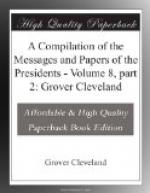ABRAHAM LINCOLN.
WASHINGTON, April 5, 1862.
To the House of Representatives:
In compliance with the resolution of the House of Representatives of yesterday, requesting any information which may have been received at the Department of State showing the system of revenue and finance now existing in any foreign country, I transmit a copy of a recent dispatch from Mr. Pike, the United States minister at The Hague. This is understood to be the only information on the subject of the resolution recently received which has not been made public.
ABRAHAM LINCOLN.
WASHINGTON, April 10, 1862.
To the Senate of the United States:
I transmit to the Senate, for its consideration with a view to ratification, a treaty between the United States and Her Britannic Majesty for the suppression of the slave trade. A copy of the correspondence between the Secretary of State and Lord Lyons on the subject of the treaty is also herewith transmitted.
ABRAHAM LINCOLN.
WASHINGTON, April 14, 1862.
To the House of Representatives:
In compliance with the resolution of the House of Representatives of the 3d ultimo, requesting information in regard to the present condition of Mexico, I transmit a report from the Secretary of State and the documents by which it was accompanied.
ABRAHAM LINCOLN.
WASHINGTON, April 15, 1862.
To the Senate of the United States:
On the 26th of June, 1860, the Senate approved of the treaty of friendship and commerce between the United States and Nicaragua, signed on the 16th of March, 1859, with certain amendments.
On the next day, namely, June 27, 1860, the Senate adopted a resolution extending the period for the exchange of the ratifications of the treaty for six months from that date; that is, until the 27th of December, 1860.
Although the amendments of the Senate were immediately transmitted to our minister in Nicaragua for submission to the Government of that Republic, he failed, notwithstanding earnest efforts, to induce that Government to call an extra session of Congress to take into consideration the amendments of the Senate of the United States within the supplementary time named in the resolution of June 27, 1860, for the exchange of ratifications.
It was not until the 25th of March, 1861, nearly three months after the expiration of the six months extended by the Senate resolution, that the Congress of Nicaragua acted favorably upon the amendments of the Senate of the United States.
A translation of the decree of the Nicaraguan Government approving the treaty as amended, with an additional amendment, is herewith inclosed.
It will be perceived that while the ratification of Nicaragua recites literally the second amendment of the Senate and accepts it with an additional clause, it does not in explicit terms accept the first amendment of the Senate, striking out the last clause of the sixteenth article.




